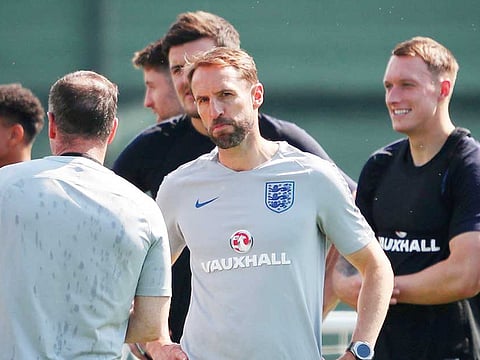Southgate sanguine as he calls for extra composure against ‘top teams’
England’s manager reflects on a ‘cruel lesson’

Repino: It was coming up for 1am local time when Gareth Southgate walked back out to acknowledge the England supporters inside the Luzhniki Stadium who were refusing to leave until he gave them one more appearance. He waved politely. He dropped his water bottle and applauded back. Briefly he scratched his head and blew out his cheeks a little, as if he could not quite believe they were still there, waiting for him, singing that song again. He waved again. He bowed. But it was unmistakable sadness etched on his face.
Over time, when the pain subsides a little, he will reflect that England have come a long way since Euro 2016 ended with chants informing the players they were not fit to wear the shirt. England’s previous World Cup campaign was wrecked by two defeats in the first week. This one made it to Day 28 before the killer blow in extra time of the semi-final. England had scored more goals than the team of 1966 and shattered their reputation as tournament football’s Slapstick XI.
That is progress in anyone’s language when there are so many wearers of that shirt with entirely different experiences. “People may have had a feeling that playing for England was always misery and regret and recrimination,” Southgate said. “Now, I think, they have seen it can be enjoyable.”
At the same time there is a risk here that the tidal wave of goodwill is threatening to submerge a difficult truth: that England were a goal ahead, 25 minutes from a World Cup final, before it all became too much for them. In the dressing room afterwards Southgate told the players everything you would expect about being proud of their achievements, thanking them individually and pointing out the warmth of the England supporters at the final whistle. First, though, he felt compelled to point out what they had to do better in the future. Even in the rawest moments, with many of the players tearful, he wanted them to listen.
“I’m not sure it was perfect by any means because the whole place was desolate,” Southgate reflected.
“But what I did say was that they have to learn from the moments that matter. There was a period when it looked like [our approach was] ‘we have the lead and don’t want to give it away’ rather than ‘we keep playing’. Against the top teams they are the moments in which you continue to play and you keep being brave.”
Instead England looked what they were: a team that would give you everything, with some fine players and, indeed, some excellent ones, but lacking the mentality the elite sides possess when it comes to the biggest occasions. “We just lost a bit of composure,” Southgate said. It was a “cruel lesson”.
At the next World Cup almost all these players will still be available and, in theory, better for the experience. Jordan Pickford will be 28, approaching the age when goalkeepers are supposed to peak. Marcus Rashford will still be young, at 24, but armed with another four years’ experience. Raheem Sterling, at 27, should be a more competent finisher than he is now. Harry Kane will be 28, Dele Alli 26, Jesse Lingard 29, John Stones 28, Harry Maguire 29, Ruben Loftus-Cheek 26 and Trent Alexander-Arnold 23.
Jordan Henderson, Kieran Trippier and Kyle Walker will be in their early 30s but still of an age to play at Qatar 2022. It is only Ashley Young, Gary Cahill and Jamie Vardy who can probably be discounted on grounds of age. “We have one of two paths to go,” Southgate said. “This is either a moment of rare hope and we sink back. Or we build in the way that Germany did in 2010.”


